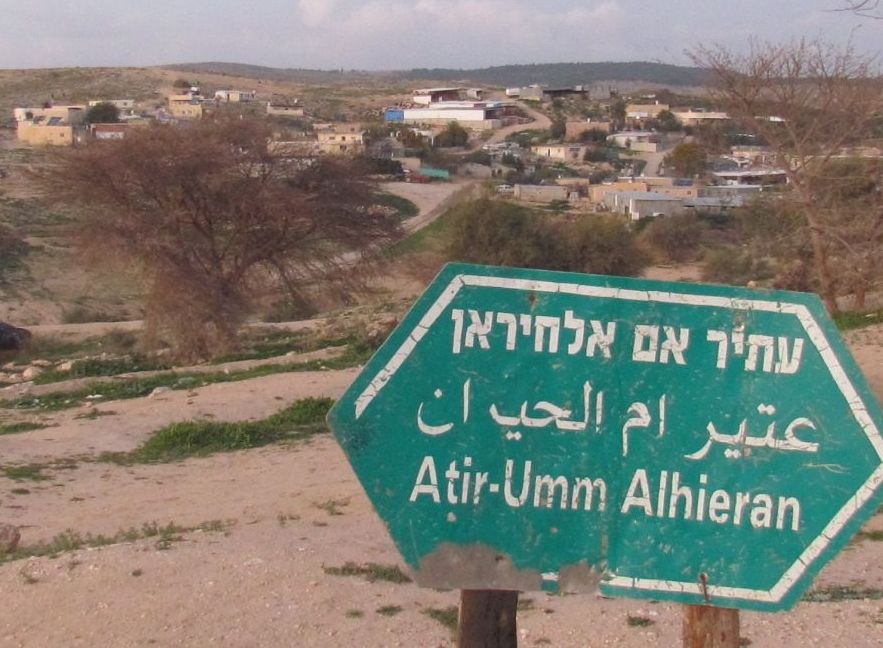Webinar: Demolitions in Umm al-Hiran

[vc_row][vc_column][vc_single_image image=”3606″ img_size=”full” alignment=”center”][vc_column_text]The week of March 20, 2018, Israel served demolition notices to every home and structure, including the mosque, in the Palestinian Bedouin village of Umm al-Hiran in the Naqab. Umm al-Hiran is home to more than 350 Palestinian citizens of Israel, who will be rendered homeless at some point between April 15-29, 2018, according to the notices from Israeli authorities. And Israeli settlers are primed to swoop in, literally camped out in mobile homes just outside the village.
With the help of Adalah-The Legal Center for Arab Minority Rights in Israel, the people of Umm al-Hiran have been fighting their impending displacement in Israeli courts for years. Umm al-Hiran is one of the scores of Palestinian Arab villages and towns in Israel unrecognized by the state and deprived of basic services such as electricity, running water, and proper road infrastructure. Meanwhile, Israel is set on displacing this Palestinian village for the second time in order to build a new Jewish colony, “Hiran,” on the exact site of the village. The “Hiran” settlers are funded directly by the Jewish National Fund-USA as part of its Blueprint Negev program that seeks to Judaize the Naqab.
On Land Day, March 30, Adalah and USCPR put on a webinar to hear from Palestinian MK Haneen Zoabi about the resistance efforts of the residents of Umm al-Hiran, the Palestinian Bedouin community, and the legal and political strategies being used to combat land confiscation.
Remove Palestinians, replace with Israeli Jews. Rinse and repeat. Displacement of Palestinians, both in the West Bank, including East Jerusalem, and inside Israel, represents different tactics of the same Israeli policy of settler colonialism and are manifestations of the ongoing Nakba. In 2015, Israel planned to demolish the village of Susiya in the southern Hebron hills of the West Bank on the other side of the Green Line, a few miles away from Umm al-Hiran. The Israeli settlers in both Umm al-Hiran and in Susiya share an expansionist, exclusionary ideology, work together and send their children to the same schools. The Israeli state’s agenda is consistent on both sides of the green line; take Palestinian land, get rid of the Palestinians.
We’re holding this webinar on Land Day, because of its connection with an important event in the Palestinian struggle over land and the relationship of Palestinians citizens to the state of Israel. Land Day, marked each March 30, is a commemoration for Palestinians of the events of 1976 where Palestinian citizens of Israel organized a general strike and marches in the Galilee and Naqab in response to the Israeli government’s announcement of a plan to seize thousands of dunams of land. The Israeli army and police used extreme violence to confront the protesters, killing six unarmed Palestinian citizens. We’ll be making clear in the webinar how that event, and the demolition of Umm al-Hiran and Susiya and other Palestinian villages and homes, are all part of the ongoing Nakba.
[/vc_column_text][vc_separator color=”custom” accent_color=”#dd3333″][vc_column_text
Haneen Zoabi is a member of the Israeli Knesset where she vocally fights for Palestinian rights. She was the first Palestinian woman to be elected to the Israeli Parliament in 2009. She is the founder of the Media Center for Arab Palestinians in Israel. She studied Psychology and Philosophy at the University of Haifa.
Moderated by Sandra Tamari, Director of Strategic Partnerships at the Adalah Justice Project, the US partner organization of Adalah-The Legal Center for Arab Minority Rights in Israel.[/vc_column_text][/vc_column][/vc_row][vc_row][vc_column][/vc_column][/vc_row]